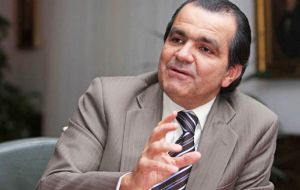MercoPress. South Atlantic News Agency
Another chapter of Colombia peace talks closed; FARC admits links with the drug trade
 President Santos is running for re-election, but is sliding in opinion polls
President Santos is running for re-election, but is sliding in opinion polls Colombia's government and FARC rebels announced on Friday an agreement to jointly combat illicit drug trade in the country as part of a six-point peace plan. The deal comes ahead of May 25 elections in the country and is an implicit admission of the guerrillas' links with the drug trade.
The deal is part of a six-point peace plan negotiated from the Cuban capital Havana between the government of President Juan Manuel Santos and the Revolutionary Armed Forces of Colombia (FARC).
“What we have agreed upon recognizes that in order to set then bases for a stable and lasting peace in Colombia it is necessary to find a definitive solution to the problem of illicit drugs,” a statement from the talks said.
Under the agreement, the FARC, “will divorce itself completely from the drug trade”, which it had denied involvement with, claiming it only ever taxed producers. Colombian authorities, however, had accused some FARC fronts of being involved in the production and sales of drugs.
Colombia was for a long time the world's leading cocaine producer, and was only recently eclipsed by Peru.
It was the latest deal reached during months of talks in Havana with the two sides having earlier reached agreements on rural development and the rebels' reintegration into the political process.
The sides still have to tackle the three remaining agenda items which include the laying down of weapons by the FARC, compensation for victims of the conflict and deciding whether a final peace agreement should be put to a national referendum.
Earlier on Friday FARC issued a statement saying they would observe a 20/28 May truce during the country's May 25 presidential elections as a gesture of goodwill, although they “don't trust Colombia's electoral system”.
In the past, rebels have tried to disrupt elections and often dismiss the country's electoral politics as dominated by elites.
The FARC has battled a dozen governments since it began as an agrarian struggle against rural inequality but has been weakened over the past 10 years by a heavy US-backed offensive. The conflict has killed more than 200,000 people and displaces at least three million since it began almost five decades ago.
The new scenario seems to emerge from the fact that former president Alvaro Uribe, and his presidential candidate Oscar Ivan Zuluaga, are rapidly climbing in opinion polls while Santos bid for re-election is losing force.
Uribe is totally against peace talks and insists FARC must surrender and turn their weapons unconditionally otherwise the Colombian Army will continue battling them.





Top Comments
Disclaimer & comment rulesCommenting for this story is now closed.
If you have a Facebook account, become a fan and comment on our Facebook Page!